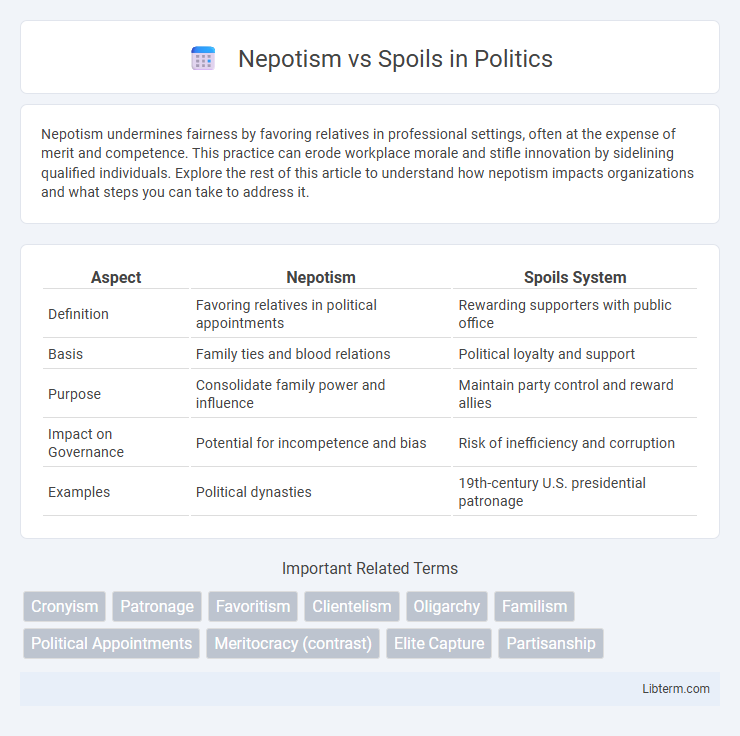Nepotism undermines fairness by favoring relatives in professional settings, often at the expense of merit and competence. This practice can erode workplace morale and stifle innovation by sidelining qualified individuals. Explore the rest of this article to understand how nepotism impacts organizations and what steps you can take to address it.
Table of Comparison
| Aspect | Nepotism | Spoils System |
|---|---|---|
| Definition | Favoring relatives in political appointments | Rewarding supporters with public office |
| Basis | Family ties and blood relations | Political loyalty and support |
| Purpose | Consolidate family power and influence | Maintain party control and reward allies |
| Impact on Governance | Potential for incompetence and bias | Risk of inefficiency and corruption |
| Examples | Political dynasties | 19th-century U.S. presidential patronage |
Understanding Nepotism: Definition and Origins
Nepotism refers to the practice of favoring relatives or close friends by giving them jobs or advantages, often in professional or political contexts. Its origins trace back to the Latin word "nepos," meaning nephew or grandson, historically linked to the preferential treatment of family members by Catholic popes and rulers. Understanding nepotism involves recognizing its impact on fairness, meritocracy, and organizational integrity compared to spoils systems based on political loyalty.
The Spoils System: Historical Context
The spoils system emerged prominently in 19th-century American politics, notably under President Andrew Jackson's administration, where government jobs were awarded based on political loyalty rather than merit. This practice institutionalized patronage, allowing victors of elections to distribute public offices to supporters as a reward for their assistance. Unlike nepotism, which favors family members, the spoils system broadly targeted political allies, reshaping government employment and contributing to widespread administrative inefficiency and corruption.
Key Differences Between Nepotism and the Spoils System
Nepotism involves favoritism granted to relatives or close friends, especially by giving them jobs or advantages, while the spoils system refers to the practice of awarding government jobs to political supporters after an election victory. Nepotism is primarily based on personal relationships, whereas the spoils system is driven by political loyalty and patronage. The key difference lies in nepotism's focus on family ties, contrasting with the spoils system's emphasis on rewarding political allies regardless of kinship.
How Nepotism Manifests in Modern Institutions
Nepotism manifests in modern institutions through preferential hiring and promotions of family members, often bypassing meritocratic standards, which undermines organizational efficiency and morale. It frequently appears in corporate boards, political appointments, and academia, where decision-makers favor relatives or close associates for key roles. This practice can lead to reduced diversity and perpetuate inequality by limiting opportunities for qualified external candidates.
Political Impacts of the Spoils System
The spoils system profoundly influenced 19th-century American politics by prioritizing loyalty over merit, leading to widespread government corruption and inefficiency. Political appointments were awarded based on party allegiance rather than qualifications, undermining public trust and institutional effectiveness. This patronage practice fueled partisan divisions and hindered the development of a professional civil service.
Ethical Implications of Nepotism and Cronyism
Nepotism and cronyism undermine organizational ethics by promoting favoritism based on personal relationships rather than merit, leading to unfair advantages and decreased morale among employees. Such practices compromise transparency and accountability, increasing the risk of corruption and inefficiency within institutions. Addressing these ethical concerns requires strict policies that encourage merit-based promotions and foster a culture of fairness and integrity.
The Role of Meritocracy in Combatting Favoritism
Meritocracy plays a critical role in combatting nepotism and spoils systems by ensuring that individuals are selected and promoted based on their abilities and achievements rather than personal connections or political favors. Organizations that implement merit-based hiring and evaluation processes reduce bias, increase efficiency, and foster a culture of fairness and accountability. Transparent performance metrics and equitable opportunities for all candidates reinforce the integrity of institutions and promote long-term success.
Consequences of Nepotism in the Workplace
Nepotism in the workplace often results in decreased employee morale and reduced productivity as qualified candidates may be overlooked in favor of relatives. This practice can foster a toxic work environment, leading to increased resentment and higher turnover rates. Companies experiencing nepotism risk damaging their reputation and losing competitive advantage due to perceived unfairness and lack of merit-based advancement.
Reforming the Spoils System: Examples from History
The spoils system, prominent in 19th-century American politics, prioritized rewarding political supporters with government jobs, often leading to inefficiency and corruption. Reform efforts such as the Pendleton Civil Service Reform Act of 1883 established merit-based hiring practices, reducing nepotism and patronage by requiring competitive exams for federal employment. Historical examples demonstrate that these reforms improved administrative competence and curbed favoritism in public service.
Strategies for Promoting Fairness and Transparency
Implementing clear merit-based recruitment and promotion policies reduces nepotism by ensuring candidates are evaluated on qualifications and performance. Establishing independent oversight committees and transparent reporting mechanisms helps detect and prevent spoils system abuses in public appointments. Regular audits and public disclosure of decision-making processes enhance accountability and build trust in organizational fairness.
Nepotism Infographic

 libterm.com
libterm.com